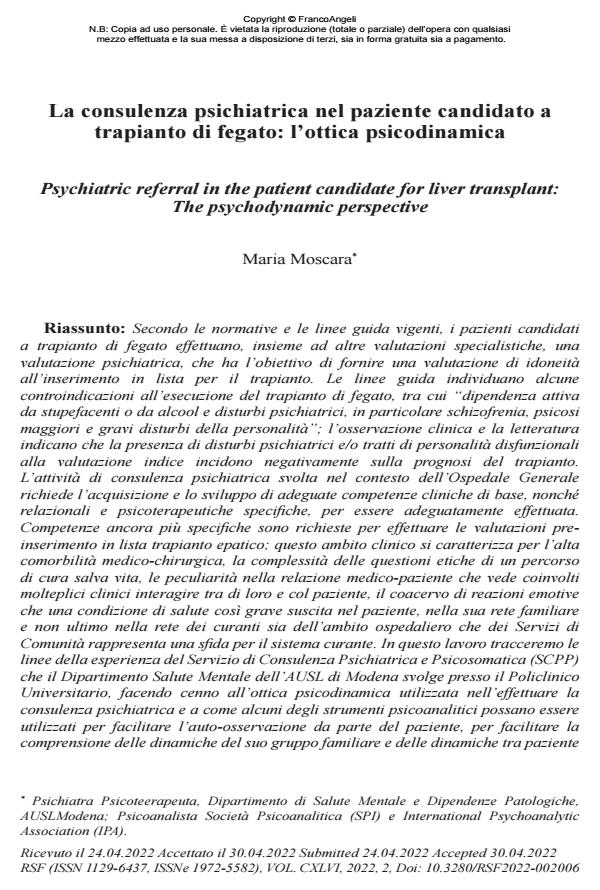Psychiatric referral in the patient candidate for liver transplant: The psychodynamic perspective
Journal title RIVISTA SPERIMENTALE DI FRENIATRIA
Author/s Maria Moscara
Publishing Year 2022 Issue 2022/2
Language Italian Pages 15 P. 79-93 File size 172 KB
DOI
DOI is like a bar code for intellectual property: to have more infomation
click here
Below, you can see the article first page
If you want to buy this article in PDF format, you can do it, following the instructions to buy download credits

FrancoAngeli is member of Publishers International Linking Association, Inc (PILA), a not-for-profit association which run the CrossRef service enabling links to and from online scholarly content.
According to current regulations and guidelines, patients who are candidates for liver transplantation undergo, together with other specialist assessments, a psychiatric evaluation, which aims to provide a judgment of suitability for inclusion on the transplant list. The guidelines identify some contraindications to performing a liver transplant, including active addiction to drugs or alcohol and psychiatric disorders, in particular schizophrenia, major psychosis and severe personality disorders; clinical observation and literature indicate that the presence of psychiatric disorders and / or dysfunctional personality traits at the index evaluation negatively affect the prognosis of the transplant. The psychiatric consultation activity carried out in the context of the General Hospital requires the acquisition and development of adequate basic clinical skills, as well as specific relational and psychotherapeutic skills, in order to be adequately carried out. Even more specific skills are required to carry out the pre-insertion assessments in the liver transplantation list; this clinical area is characterized by the high medical-surgical comorbidity, the complexity of the ethical issues of a life-saving treatment path, the peculiarities in the doctor-patient relationship that involves multiple clinicians interacting with each other and with the patient, the jumble of the emotional reactions that such a serious health condition arouses in the patient, in his family network and, last but not least, in the network of caregivers both in the hospital and in the Community Services represents a challenge for the healthcare system. In this work we will trace the lines of the experience of the Psychiatric and Psychosomatic Counseling Service (SCPP) that the Mental Health Department of the AUSL of Modena carries out at the University Hospital, mentioning the psychodynamic perspective used in carrying out psychiatric counseling and how some psychoanalytic tools can be used to facilitate the patient's self-observation, to facilitate the understanding of the dynamics of his family group and of the dynamics between patient and treating group and, last but not least, of the relationships between the different members of the treating staff. The psychoanalytic tools allow you to give a reading of the moments of relational blocks with the patient and in the treating group to facilitate understanding of the mechanisms that support them and facilitate their overcoming.
Keywords: Consultation psychiatry, liver transplantation, psychoanalytic tools, psychodynamic approach
Maria Moscara, La consulenza psichiatrica nel paziente candidato a trapianto di fegato: l’ottica psicodinamica in "RIVISTA SPERIMENTALE DI FRENIATRIA" 2/2022, pp 79-93, DOI: